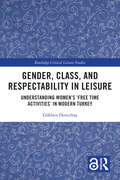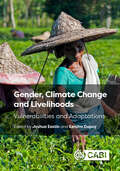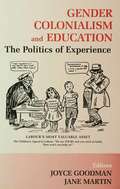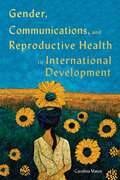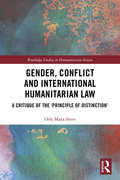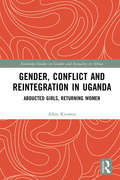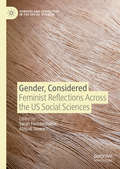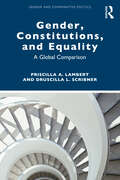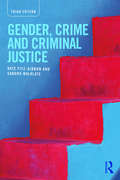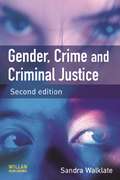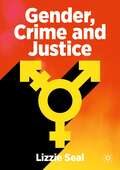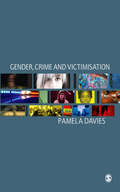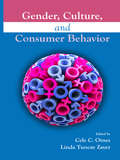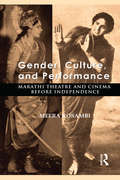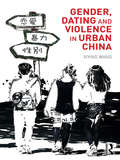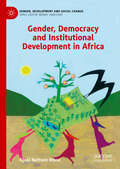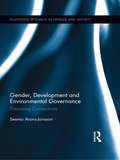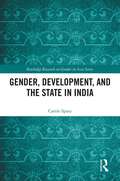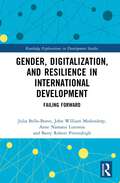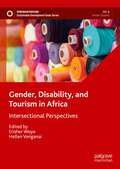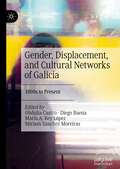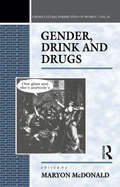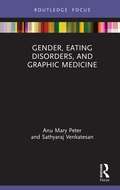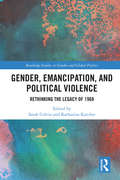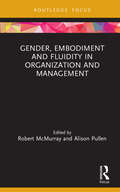- Table View
- List View
Gender, Class, and Respectability in Leisure: Understanding Women’s ‘Free Time Activities’ in Modern Turkey (Routledge Critical Leisure Studies)
by Gökben DemirbaşThis book interrogates the role of gender and class in shaping women’s everyday leisure practices. Drawing on empirical research in urban Turkey, the book explores how leisure is perceived and practised by women within their communities.The book examines the relationship of women’s leisure to their labour, women’s access to and uses of public leisure spaces, and the dynamics of their everyday sociability within their neighbourhoods. It is the first book to apply Skegg’s concept of ‘respectability’ – socially recognised judgments and standards which label the ‘right’ practices, that hold morality and power in a given context – as a theoretical tool with which to understand leisure in a country in which modernisation and Westernisation have been a central dynamic shaping political, social, and cultural life. This analysis reveals that two measures of gendered respectability – reproductive work and the honour code – and how they mediate with the classed measures of respectability, are essential to understanding women’s leisure practices in the Turkish context. The book argues that these interactions are likely shared in many Global South countries, including Islamic societies. Therefore, this analysis shines important new light on women’s experiences more broadly, and on the social, political, and cultural dynamics of traditional social structures in a modernising world.This book is fascinating reading for anybody with an interest in leisure studies, women’s studies, sociology, cultural studies, or Middle East studies.
Gender, Climate Change and Livelihoods: Vulnerabilities and Adaptations
by Margaret Alston Salim Momtaz Elizabeth Bryan Muhammad Asaduzzaman Nahid Rezwana Aden Aw-Hassan Elisabeth Garner Patricia E. Perkins Agnes Babugura Bipasha Baruah Abderrahim Bentaibi Quinn Bernier Yvonne Braun Boubaker Dhehibi Diana Hummel Zobaidul Kabir Edward Kato Francis Mwesigye Dina Najjar Balikisu Osman Elizabeth Opiyo Onyango Shahreen ShehwarThis book applies a gendered lens to evaluate the dynamic linkages between climate change and livelihoods in developing countries. It examines how climate change affects women and men in distinct ways, and what the implications are for earning income and accessing the natural, social, economic, and political resources required to survive and thrive. The book's contributing authors analyze the gendered impact of climate change on different types of livelihoods, in distinct contexts, including urban and rural, and in diverse geographic locations, including Asia, Africa and the Caribbean. It focuses on understanding how public policies and power dynamics shape gendered vulnerabilities and impacts, how gender influences coping and adaptation mechanisms, and how civil society organizations incorporate gender into their climate advocacy strategies. This book: -Provides cutting-edge scholarship on an underrepresented area of climate change: the gendered impacts of climate change on livelihoods. -Covers a range of different types of livelihoods and geographic locations. -Involves contributors from a diverse array of cultural and scholarly backgrounds, bringing contrasting perspectives to the topic. This book is recommended for scholars, students, and practitioners who study or work in fields such as climate change, gender, livelihoods, public policy, economic development, and agriculture.
Gender, Colonialism and Education: An International Perspective (Woburn Education Series)
by Jane Martin Joyce GoodmanAn examination of the ways in which gender intersects with informal and formal education in England, Germany, Indonesia, South Africa, USA and the Netherlands. The book looks at various issues including: citizenship; authority; colonialism and education; and the construction of national identities.
Gender, Communications, and Reproductive Health in International Development (McGill-Queen's/Brian Mulroney Institute of Government Studies in Leadership, Public Policy, and Governance #15)
by Carolina MatosTo this day, women globally are subjected to forms of control over their bodies, and their ability to exercise their reproductive rights in particular is still constrained. Amid a rise of challenges to the advancement of women’s rights, including the recent overturning of Roe v. Wade in the United States, sexual and reproductive health rights are at the forefront of conversations about the advancement of gender equality. To determine how communications are used strategically to shape policy, Carolina Matos explores fifty-two feminist and health NGOs from across the world and how they are improving discourse on sexuality and reproductive health in the public sphere. She investigates how these organizations are making use of communications amid various contemporary challenges, including the proliferation of misinformation about women’s rights and health in the public sphere due to the actions of oppositional far-right nationalist groups. Through original in-depth interviews within the NGOs and empirical research of the institutions’ online presences, Matos unpacks the complexities of the relationship between women’s health, communications, and development, contributing to the fields of development, health communications, and gender studies, and advancing the debate on the role of feminist NGOs in advocating for women’s rights. With a postcolonial critique of the role of NGOs in development, Matos illuminates the strategic use of communications in the mediation and advocacy of gender equality and reproductive health.
Gender, Conflict and International Humanitarian Law: A critique of the 'principle of distinction' (Routledge Studies in Humanitarian Action)
by Orly Maya SternThis book conducts a gendered critique of the ‘principle of distinction’ in international humanitarian law (IHL), with a focus on recent conflicts in Africa. The ‘principle of distinction’ is core to IHL, and regulates who can and cannot be targeted in armed conflict. It states that civilians may not be targeted in attack, while combatants and those civilians directly participating in hostilities can be. The law defines what it means to be a combatant and a civilian, and sets out what behaviour constitutes direct participation. Close examination of the origins of the principle reveals that IHL was based on a gendered view of conflict, which envisages men as fighters and women as victims of war. Problematically, this view often does not accord with the reality in ‘new wars’ today in which women are playing increasingly active roles, often forming the backbone of fighting groups, and performing functions on which armed groups are highly reliant. Using women’s participation in ‘new wars’ in Africa as a study, this volume critically examines the principle through a gendered lens, questioning the extent to which the principle serves to protect women in modern conflicts and how it fails them. By doing so, it questions whether the principle of distinction is suitable to effectively regulate the conduct of hostilities in new wars. This book will be of much interest to students of international law, gender studies, African politics, war and conflict studies, and international relations.
Gender, Conflict and Reintegration in Uganda: Abducted Girls, Returning Women (Routledge Studies on Gender and Sexuality in Africa)
by Allen KiconcoThis book explores what happened when the tens of thousands of girls (now women) abducted by Lord’s Resistance Army and inducted into their campaign of violence against the Ugandan government, returned home. Drawing on extensive original research, the author considers the challenges which the formerly abducted women have encountered upon their return, the strategies which have been used to aid their reintegration, and the enduring stigma of abduction which they continue to suffer from. The author demonstrates that ‘home’, a place of hope and comfort, can also be a hostile environment which leaves formerly abducted women in precarious and vulnerable situations. The many shortcomings in the reintegration process have serious implications for the prospects of post-conflict reconstruction. Analysing reintegration as a long-term and dynamic process which involves complex negotiations and exchanges between hosting communities and formerly abducted women, this book will be of interest to scholars, policymakers and practitioners working in the fields of post-conflict reconstruction, African politics and gender and conflict.
Gender, Considered: Feminist Reflections Across the US Social Sciences (Genders and Sexualities in the Social Sciences)
by Abigail J. Stewart Sarah FenstermakerThis book gathers reflections from 15 US based feminist social scientists about gender – as orienting framework, as one aspect of an intersectional approach, as a feature of intellectual identity, and as a problematic construct. Gender as an analytic, dynamic concept has had an important impact within and across social sciences in the past several decades. That impact for some arose in dialogue with interdisciplinary women’s studies, and was sometimes troubled both in women’s studies and in relation to other interdisciplines and disciplines. As a new generation of gender scholars embarks on their careers in social science, Fenstermaker and Stewart's collection provides scholars an opportunity to reflect on the course of different disciplinary histories and autobiographies, as well as illuminate individual scholarly craft and disciplinary direction as our understanding of gender has unfolded over time. The volume will also represent one kind of collective wisdom to inspire younger scholars.
Gender, Constitutions, and Equality: A Global Comparison (Gender and Comparative Politics)
by Priscilla A. Lambert Druscilla L. ScribnerThis book addresses whether the "gendering" of constitutions promotes women’s equality. The authors use a mixed-methods approach to explore how constitutional gender rights affect political processes and strategies, legislative and judicial outcomes, and ultimately women’s equality. They employ a cross-national study by constructing a unique database of gender provisions in over 100 countries at three points in time: 1995, 2005, and 2015. Four in-depth comparative case studies on Argentina, Chile, South Africa, and Botswana trace the complex relationship between constitutional law, strategies, and policy change in four policy areas: family law, gender-based violence, reproductive rights, and employment rights. They argue that where egalitarian constitutional provisions are present, women’s rights advocates can use them as a tool to fight gender discrimination and pursue policy changes that address gender-based power disparities. At a time when gender equality provisions are increasingly common in constitutional design, this book clarifies the mechanisms that link constitutional provisions to changes in process and outcomes while also systematically describing and analyzing the effect of gender provisions across countries and over time. Gender, Constitutions, and Equality will inform theoretical debates on gender and politics, law and social change, feminist institutionalism, and constitutional design and its effect on legislation and political strategies.
Gender, Crime and Criminal Justice
by Sandra Walklate Kate Fitz-GibbonThis book examines the relationship between gender and crime and explores both the gendered nature of crime alongside the gendered nature of criminal victimisation. Covering theory, policy and practice, this new edition has been fully revised to reflect the wider changes, development and influence of gendered thinking in these areas. It brings together a range of key issues, including: Theories and concepts in feminist criminology, Gender and victimisation, Sexual and domestic violence, Male dominance in the criminal justice system, Gendered perspectives in law and criminal justice policy. New to the third edition is increased coverage of gender and crime in international perspective, particularly within the global south, and emerging concepts of risk and security. This is essential reading for advanced courses on gender and crime, women and crime, and feminist criminology.
Gender, Crime and Criminal Justice
by Sandra L. WalklateThis book provides a lucid and highly acclaimed introduction to gender issues in crime and criminal justice, central to any understanding of crime and criminal justice policy and practice. This second edition has been updated to take full account of recent developments, particularly in the areas of policing, crime prevention, restorative justice and legislation relating to sexual offences and the nature and impact of crime on women ? in particular the Sexual Offences Act 2003. Gender, Crime and Criminal Justice is divided into three main sections. The first considers different ways of theorising about gender and the relative impact of this on thinking about crime and criminal victimisation; the second considers some of the evidence in relation to people's gendered experiences of crime and criminal victimisation; the third considers how those working within the criminal justice system, and the policies that are put in place, work to sustain or change those experiences of crime and criminal victimisation in relation to gender.
Gender, Crime and Justice
by Lizzie SealThis textbook takes a gender inclusive and intersectional feminist approach to examining key topics related to gender, crime and justice. It provides an overview and critical discussion of contemporary issues and research in this area suitable for use in undergraduate and postgraduate degree modules. A key feature of the book is its use of films, television series and documentaries to illustrate the concepts and findings from criminological research on gender, crime and justice. After outlining the meaning of gender and the perspective of intersectional feminism, it has chapters focused on interpersonal and sexual violence, sex work and the night-time economy, street crime, crimes of the powerful, policing and the courts, prison and community penalties and a final chapter on extreme punishment and abolitionist futures. It speaks to students and academics in criminology, sociology and gender studies.
Gender, Crime and Victimisation
by Pamela DaviesGender, Crime and Victimisation is a thoughtful and thought-provoking book, exploring gender patterns in both offending and victimisation. It offers a thorough examination of how these patterns in society are variously established and represented, researched, explained and responded to by policy makers and criminal justice agencies. Bringing together key theory, research and policy developments, the book combines perspectives on the study of criminology with those of victimology and gender studies - drawing particularly on the influence of feminism. It analyses processes of criminalisation and social control, and their structural biases. It explores fears, anxieties and worries about crime, as well as particular vulnerabilities to crime. The book employs a range of learning devices to support the student reader, including: o Chapter overviews o Case studies and examples o Study questions o Further reading at the end of each chapter o A comprehensive glossary Comprehensive and robust, Gender, Crime and Victimisation provides a stimulating and topical overview that will appeal to undergraduates,
Gender, Culture, and Consumer Behavior
by Cele C. Otnes Linda Tuncay ZayerThis book covers the gamut of topics related to gender and consumer culture. Changing gender roles have forced scholars and practitioners to re-examine some of the fundamental assumptions and theories in this area. Gender is a core component of identity and thus holds significant implications for how consumers behave in the marketplace. This book offers innovative research in gender and consumer behavior with topics relevant to psychology, marketing, advertising, sociology, women’s studies and cultural studies. It offers 16 chapters of cutting-edge research on gender, international culture and consumption. Unique to this volume is its emphasis on consumption and masculinity and inclusion of topics on a rapidly changing world of issues related to culture and gender in advertising, communications, psychology and consumer behavior.
Gender, Culture, and Performance: Marathi Theatre and Cinema before Independence
by Meera KosambiThis book presents a lucid, comprehensive, and entertaining narrative of culture and society in late 19th- and early 20th-century Maharashtra through a perceptive study of its theatre and cinema. An intellectual tour de force, it will be invaluable to scholars and researchers of modern Indian history, theatre and film studies, cultural studies, sociology, gender studies as well as the interested general reader.
Gender, Dating and Violence in Urban China (Routledge Culture, Society, Business in East Asia Series)
by Wang XiyingThis book explores young people’s experiences of, and views on, dating, gender, sexuality, sexual hegemony and violence within dating relationships. Based on interviews and focus groups conducted in Beijing over a decade, and focusing especially on dating violence, the book reveals provides insights into a wide range of issues of gender and sexuality in contemporary China. It shows how young Chinese people’s attitudes and behaviors are changing as urban China develops rapidly, and how their experience of dating violence and meaning-making are affected by age, gender, location and class.
Gender, Democracy and Institutional Development in Africa (Gender, Development and Social Change)
by Njoki Nathani WaneThis book analyses African foundations of gender, education, politics, democracy and institutional development by stimulating theoretical discourses. It offers a discursive framework on ways to examine the conceptualizations of African social development and a critical discourse on debunking the misconceptions that are attached to African location in the global arena. The volume challenges the danger of minimizing and oversimplifying the role of Africa in the international space. This will be ideal for researchers, students and scholars in the areas of African and gender studies, development, politics and education.
Gender, Development and Environmental Governance: Theorizing Connections (Routledge Research in Gender and Society #33)
by Seema Arora-JonssonA major challenge in studies of environmental governance is dealing with the diversity of the people involved at multiple levels – villagers, development agents, policy-makers, private resource users and others – and taking seriously their aspirations, conflicts and collaborations. This book examines this challenge in two very disparate parts of our world, exploring what gender-equality, resource management and development mean in real terms for its inhabitants as well as for our environmental futures. Based on participatory research and in-depth fieldwork, Arora-Jonsson studies struggles for local forest management, the making of women’s groups within them and how the women’s groups became a threat to mainstream institutions. Insights from India, consistently ranked as one of the most gender-biased countries, are compared with similar situations in the ostensibly gender-equal Sweden. Arora-Jonsson also analyzes how dominant ideas about the environment, development and gender equality shape the spaces in which women and men take action through global discourses and grassroots activism. Questioning the conventional belief that development brings about greater gender equality and more efficient environmental management, this volume scrutinizes how environmental imaginations are key to crafting gender relations. It shows gender to be at the heart of environmental negotiations while at the same time making a case for environmental sensibilities as integral to gender relations. At the confluence of development, environmental and gender studies, the book contributes to a much-needed dialogue between these fields, proposing new futures in environmental management.
Gender, Development, and the State in India (Routledge Research on Gender in Asia Series)
by Carole SparyThis book explores the relationship between the state, development policy, and gender (in)equality in India. It discusses the formation of state policy on gender and development in India in the post-1990 period through three key organising concepts of institutions, discourse, and agency. The book pays particular attention to whether the international policy language of gender mainstreaming has been adopted by the Indian state, and if so, to what extent and with what results. The author examines how these issues play out at multiple levels of governance – at both the national and the subnational (state) level in federal India. This comparative aspect is particularly important in the context of increasing autonomy in development policymaking in India in the 1990s, divergent development policy approaches and outcomes among states, and the emerging importance of subnational state development policies and programmes for women in this period. The author argues that the state is not a monolith but a heterogeneous, internally differentiated collection of institutions, which offers complex and varying opportunities and consequences for feminists engaging the state. Demonstrating that the Indian empirical case is illuminating for studies of the gendered politics of development, and international debates on gender mainstreaming, the book highlights the politics of negotiating gender equality strategies in the contemporary context of neo-liberal development and brings together complex issues of modernity, postcolonialism, identity politics, federalism, and equality within the broader context of the world’s largest democracy. This book will be of interest to scholars interested in the politics of gender equality, state feminism, and gender mainstreaming; federalism and multi-level governance; and development studies and gender in South Asia.
Gender, Digitalization, and Resilience in International Development: Failing Forward (Routledge Explorations in Development Studies)
by Julia Bello-Bravo John William Medendorp Anne Namatsi Lutomia Barry Robert PittendrighThis book explores the intersection of gender, digitalization, and resilience in international development. Building resilience is increasingly seen as crucial when planning and implementing development programmes, enabling communities to mitigate, adapt to, and recover from shocks and stresses in a manner that reduces chronic vulnerability and facilitates inclusive growth. Gender plays a crucial role in the resilience of development systems, as the exclusion of women from participation can make communities more vulnerable to economic shocks, perpetuating and even worsening current levels of poverty, instability, and insecurity. Drawing on meta-data from across the world, as well as specific case studies from Ghana, Kenya, Burkina Faso, and Mozambique, this book reflects on these intersections and the potential of digitalization as a democratizing tool for improving the access of women and other marginalized groups to information vital for their participation in the process of development. By outlining the importance of digitalization for addressing gender imbalances, this book draws the evidentiary lines between the role of digitalization for women and resilience as a whole. This book will be of interest to development practitioners and policy makers, as well as researchers with specialisms in gender inclusion, resilience, digitalization, and international development.
Gender, Disability, and Tourism in Africa: Intersectional Perspectives (Sustainable Development Goals Series)
by Erisher Woyo Hellen VenganaiThis book explores the intersection of gender and disability in the context of tourism. In part, the book foregrounds feminist theorising of intersectionality by examining how gender can overlap with other social identities to contribute to more systemic oppression, domination, discrimination, and marginalisation of certain categories of people. Our point of departure is that disability does not operate in isolation as it is constituted and experienced within an already gendered social and tourism environment. With substantial research on the intersection of gender and tourism on the one hand, and the intersection of disability and tourism on the other hand, the interconnectedness of gender and disability and the implications this has on tourism policy and practice remains understudied. Thus, the book provides a critical lens that helps unpack underlying assumptions about gender and disability while questioning the dominant ideas about gender and disability reproduced through tourism policies and institutional practices in an African context. This book will be of interest to scholars and researchers in Gender Studies, Disability Studies, and Tourism Studies, particularly those with a research interest in Africa.
Gender, Displacement, and Cultural Networks of Galicia: 1800s to Present
by Obdulia Castro Diego Baena María A. Rey López Miriam Sánchez MoreirasThis book, bringing together a multi-voiced dialogue between academic scholars and professionals from diverse fields, shares a comprehensive and heterogeneous look at the interdisciplinarity of Galician Studies while examining a chronologically broad range of subjects from the 1800s to the present. This volume carves out a distinct approach to gender studies investigating issues of culture, language, displacement, counterculture artists, and community projects as related to questions of politics, gender and class. Women, conceived as both individual and political bodies, are studied, among other things, as an example of what it means to struggle from the margins emphasizing the importance of looking at the opposition between the center and the peripheries when studying the relationship between space and culture.
Gender, Drink and Drugs (Cross-cultural Perspectives On Women Ser. #Vol. 10)
by Maryon McDonaldWhy do so many people feel compelled to drink alcohol or take drugs? And why do so many men drink and so many women refrain? Using ideas from social anthropology, this book attempts to provide a novel answer to these questions. The introduction surveys both gender and addiction. It points out that we cannot say what men or women are really like, in any culturally innocent sense, for gender is always, even in the realm of biology, a cultural matter. The ethnographic chapters, ranging from Ancient Rome to modern Japan, similarly suggest how any substance - from alcohol to tea to heroin - inevitably takes its meaning or reality in the cultural system in which it exists.This book will be of interest to medical anthropologists, medical sociologists, anyone with an interest in the contemporary direction of anthropology as well as those working in the fields of alcohol and addiction.
Gender, Eating Disorders, and Graphic Medicine
by Sathyaraj Venkatesan Anu Mary PeterDeveloping an understanding of eating disorders beyond the biological/medical framework has become a necessity in present times, especially when eating disorders are swiftly spreading deep roots across the world. In view of the multidimensional etiology of eating disorders, there are increased efforts towards understanding its phenomenological, cultural, and other related non-medical aspects, and Gender, Eating Disorders, and Graphic Medicine leaps past the prevalent notions on eating disorder, and contributes to the developing corpus of affective knowledge on eating disorders among women through comics and graphic medicine. Taking cues from select graphic narratives on eating disorders, this book attempts to posit graphic medicine as one of the most befitting modes of life writing. This book is distinctive in that it is an attempt not only to explore the multi-dimensional etiology of eating disorders in women using graphic medicine narratives but also to understand how graphic medicine humanizes eating disorders by offering a unique ingress into women’s phenomenological experience of eating disorders.
Gender, Emancipation, and Political Violence: Rethinking the Legacy of 1968 (Routledge Studies in Gender and Global Politics)
by Sarah Colvin Katharina KarcherThis volume presents and interrogates both theoretical and artistic expressions of the revolutionary, militant spirit associated with "1968" and the aftermath, in the specific context of gender. The contributors explore political-philosophical discussions of the legitimacy of violence, the gender of aggression and peaceability, and the contradictions of counter violence; but also women’s artistic and creative interventions, which have rarely been considered. Together the chapters provide and provoke a wide-ranging rethink of how we read not only "1968" but more generally the relationship between gender, political violence, art and emancipation. This work will be of great interest to students and scholars of protest and violence in the fields of history, politics and international relations, sociology, cultural studies, and women’s studies.
Gender, Embodiment and Fluidity in Organization and Management (Routledge Focus on Women Writers in Organization Studies)
by Alison Pullen Robert McMurrayThis third volume in the Routledge Focus on Women Writers in Organization Studies series challenges us to think again about the implications of gender, embodiment and fluidity for organizing and managing. The themes of this book disrupt our understanding of dualisms between sex (men and women), gender (masculinity and femininity) and mind / body, and in so doing analyze the ways in which dominant power relations constitute heteronormativity throughout organizational history, thereby reinforcing mainstream management research and teaching. By centring the work of women writers, this book gives recognition to their thinking and praxis; each writer making political inroads into changing the lived experiences of those who have suffered discrimination, exclusion and marginalization as they consider the ways in which organizational knowledge has tended to privilege rather than problematize masculinity, fixity, control, normativity, violence and discrimination. The themes and authors (Acker, de Beauvoir, Halberstam, Kosofsky Sedgwick, Kristeva, Yourcenar) covered in this book are important precisely because they are not generally encountered in mainstream writing on management and organization studies. They are significant to the study and analysis of organizations because they demonstrate how our understanding of managing and organizing can be transformed when other voices/bodies/genders write on what it is work, live, lead and relate to self and others. All the writers turn to the ways in which individuals matter organizationally, acknowledging that lived experiences are a source of political and ethical practice. Each Woman Writer is introduced and analyzed by experts in organization studies. Further reading and accessible resources are also identified for those interested in knowing more. This book will be relevant to students, researchers and practitioners with an interest in business and management, organizational studies, critical management studies, gender studies and sociology. Like all the books in this series, it will also be of interest to anyone who wants to see, think and act differently.
